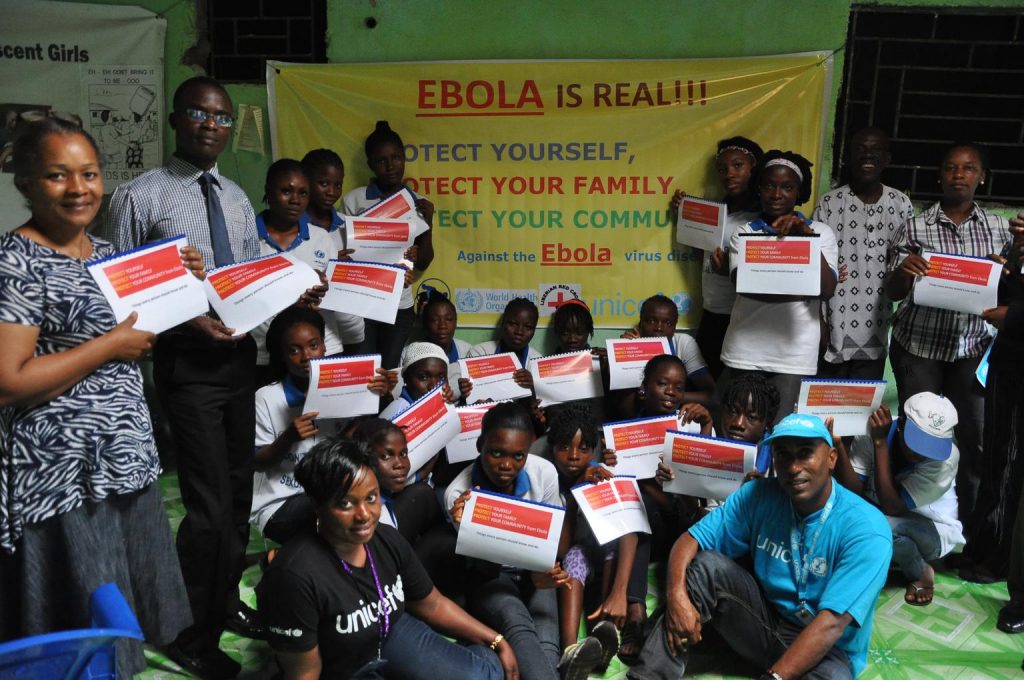Reports into the Ebola outbreak overemphasise the role of the World Health Organisation while neglecting the importance of local community responses.
Briefings
We Cannot Learn the Lessons of Ebola If We Continue to Undervalue Local Efforts
Regions
West and Central Africa
UNICEF/UNI171708/Jallanzo
On 27 August, UNICEF conducted a Training of Trainers or ToT on Ebola outreach for over 50 adolescent girls, boys and community leaders in West Point and New Kru Town - two communities in Monsterrado County that have experienced high rates of Ebola infections. UNICEFs primary targets during these ToTs were members of agency-supported girls clubs. Since the ToTs, a total of 300 girls have been trained and deployed by UNICEFs implementing partners to conduct outreach in the two communities. All 300 have been equipped with flipbooks and posters to support their door-to-door efforts. UNICEF is proud of the role these young leaders are playing in the fight against Ebola!
Location: New Kru Town, Monrovia, Montserrado County, Liberia
Photo credit: © UNICEF Liberia/2014/Ascott
Photographer: Adolphus Scott
Date: 27 August 2014
On 31 March 2014, the first cases of Ebola were confirmed in Liberia and the Government declared an outbreak. The epidemic has occurred in two distinct outbreak cycles: the first began in late March and ended in April; the second began in late May and is still ongoing.
Nearly six months since the start of the first Ebola outbreak, over 3,000 suspected, probable and confirmed Ebola cases have been reported in 14 of Liberias 15 counties, including in the capital city of Monrovia. Alarmingly, this figure reflects a 14-fold increase in cases in the last two months. Fifty-six per cent of the probable and confirmed cases have resulted in death and, as of 21 September, 180 health workers had been affected by the disease and 85 of them had died.
Recognizing the threat that Ebola posed to men, women and children across Liberia, UNICEF Liberia immediately took action to stop its spread. As a member of the Government-led Ebola National Task Force, the Country Office has played a key role since the start of the epidemic in the nationwide effort to raise awareness of Ebola and how it can be prevented. From the developmen
Related content
Briefing
Key Considerations: Child Engagement in the Context of Disease Outbreaks in Eastern and Southern Africa
Effective child engagement strategies are essential to optimise the response to disease outbreaks and minimise their impact while ensuring children’s protection, well-being and resilience. When children understand disease outbreaks, they are better able to cope, contribute and recover. This promotes…
Central and East Africa Hub
SSHAP
2024
Briefing
Key Considerations for Responding to Floods in South Sudan Through the Humanitarian-Peace-Development Nexus
In common with many other African countries, the Republic of South Sudan is increasingly experiencing devastating floods linked to climate change.1,2 The Indian Ocean Dipole (IOD) and El Niño regulate the climate of Equatorial Eastern Africa. In 2019, a dipole…
Central and East Africa Hub
SSHAP
2024
Report
Conflict-Sensitive Returns and Integration in South Sudan
Since fighting flared up in Sudan in April 2023, an estimated 8.2 million Sudanese have been forcibly displaced, out of which 1.7 million are hosted by neighbouring countries, including 588,711 people by South Sudan.1 At the same time, an estimated…
Central and East Africa Hub
2024
Briefing
Key Considerations: Social, Structural and Community Dynamics of Cholera Transmission and Mortality in Ethiopia
The current cholera outbreak in the Federal Democratic Republic of Ethiopia began in August 2022. As of April 2024, active outbreaks had been recorded in most regions of the country, including: Amhara; Dire Dawa; Harari; Oromia; Southern Nations, Nationalities and…
Central and East Africa Hub
SSHAP
2024


